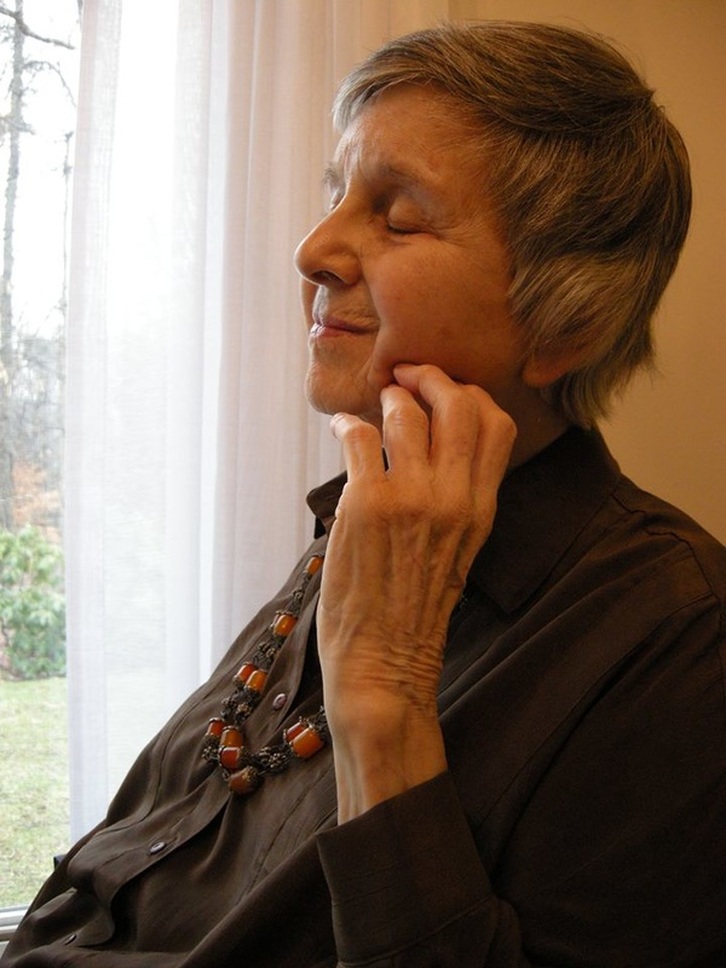|
Photograph by Sergio Guimaraes of Buenos Aires, Argentina By Karen Carnabucci, LCSW, TEP We mourn: Zerka Toeman Moreno, the co-developer of psychodrama, has died at the age of 99. When Zerka Toeman met Dr. J.L. Moreno in the summer of 1941, it was the beginning of a very successful partnership in the history of psychiatry and psychology. She would become his closest colleague, helping him edit and write books and journals and traveling with him throughout the United States and Europe to teach and demonstrate psychodrama, an action-oriented method which was considered an alternative to the psychoanalysis of the day, and sociodrama, which addressed social problems with enactment. After her husband's death, she continued to teach and expand the method, now practiced on nearly every continent -- becoming a kind of rock star herself with dozens of training institutes, schools and associations named in her honor. She died on Sept. 19, 2016 in Rockville, Md. Mrs. Moreno was born June 13, 1917 in the Netherlands. In 1932, she moved as a school girl from Amsterdam to London with her parents. She immigrated to the United States in 1939, as the clouds of inevitable war were gathering over Europe. In 1941, she brought her elder sister from Belgium to Beacon, N.Y., desperate to find help for her sister's mental illness at the sanitarium of Dr. J.L. Moreno, an innovative physician who used improvisational drama on a circular stage to address mental health problems and even then was considered a pioneering figure in group psychotherapy. He greeted her with open arms and a delighted “Yes!” and so began their collaboration. Within a year of their meeting, the pair founded the Sociometric Institute on Park Avenue in New York City. They established the Psychodramatic Institute in New York in 1942. They began producing the journal Group Psychotherapy (originally called Sociatry) in 1947, publishing a volume of research documenting their application and refinement to the social sciences of sociatry, psychodrama and sociometry.
When they were not at Beacon Hill Sanitarium attending to mentally ill patients, they offered open sessions to the public at their therapeutic theater in New York City. Well before the days of reality television, it was not uncommon for hundreds of people to gather for a Saturday night session to watch people dramatize their stories of marital unhappiness or mourn a mother’s loss on stage, directed by one of the Morenos. More than a few actors, some well known, also attended, intrigued with Moreno’s daring methods of improvisation. The Morenos traveled throughout the United States to demonstrate the psychodramatic method at colleges, conferences, mental hospitals and veterans hospitals before opening a training institute in 1948 to train others in the method, which gave birth to the role play that is so common today. The institute attracted psychiatrists, psychologists, sociologists, ministers, nurses and social workers. After Dr. Moreno’s death in 1974, Zerka continued to teach at Beacon until the original stage was dismantled and moved to Boughton Place, near Highland, N.Y., where she instructed during the 1980s and 1990s, attracting trainees from throughout the United States and internationally. Her companion of many years, Merlyn Pitzele, died in 1996, and she added to her training tour list: England, Scandinavia, Israel, Brazil, Taiwan, China, Japan and Turkey, drawing appreciative crowds of mental health professionals. After a serious fall in Riga, Latvia, she retired to a cottage in Charlottesville, Va., where she conducted sessions in her living room, again drawing eager U.S. and international visitors. Many believe that her editing and writing made Dr. Moreno’s ideas more easily understood and accepted by professionals in other fields, and many more believe that Moreno and his method would have been a mere footnote in the annals of psychiatry and psychology had it not been for his wife’s constant dedication in supporting the development and expansion of psychodrama. On her own, she was a featured faculty member at Second Evolution of Psychotherapy Conference in Anaheim, Calif., the large and well-established conference organized by the Milton H. Erickson Foundation, and at conferences worldwide. Her book, To Dream Again: A Memoir, was published in 2012. Previous books include Psychodrama, Surplus Reality and the Art of Healing with co-authors Leif Dag Blomkvist and Thomas Reutzel in 2000, and The Quintessential Zerka: Writings by Zerka Toeman Moreno on Psychodrama, Sociometry and Group Psychotherapy in 2006. Her son, Jonathan D. Moreno, is professor of medical ethics and health policy at the University of Pennsylvania; his most recent book, Impromptu Man: J.L. Moreno and the Origins of Psychodrama, Encounter Culture, and the Social Network, details the life and times of his father. Her stepdaughter is Regina Moreno, who used her father’s sociodrama, role training and sociometric choice techniques with elementary, middle school and college students for the past 45 years and helped found the Bay Area Moreno Institute near Berkeley, Calif., where she lives. There will be a celebration of her life at the May 4-7, 2017 annual meeting of the American Society of Group Psychotherapy and Psychodrama in Clearwater, Fla. The professional organization also plans to publish a special edition of the Journal of Psychodrama, Sociometry and Group Psychotherapy, focusing on her life, teachings and legacy. Memorial contributions may be sent to the American Society of Group Psychotherapy and Psychodrama, 301 N. Harrison Street, #508, Princeton, NJ 08540 or by visiting www.asgpp.org. Funds will be used to publish the special edition journal about Zerka T. Moreno; to establish a Zerka T. Moreno international scholarship; and to preserve her papers at the Harvard and Boston University Francis A. Countway Library of Medicine, Rare Book Collection - History of Medicine, Boston, Mass.
0 Comments
Your comment will be posted after it is approved.
Leave a Reply. |
AuthorKaren Carnabucci, LCSW, TEP, is an author, trainer and psychotherapist who promotes, practices and teaches experiential methods including psychodrama, Family and Systemic Constellations, sand tray, mindfulness and Tarot imagery. Archives
December 2023
Categories
All
|

 RSS Feed
RSS Feed